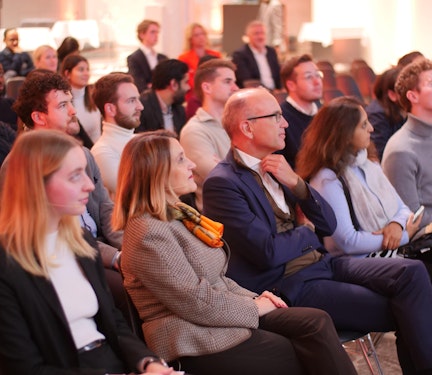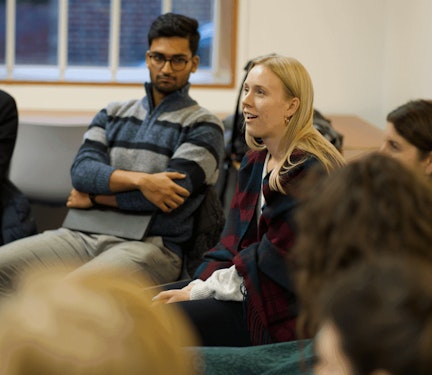
Between 8th-12th December, the Third Annual Global Leadership Challenge (GLC) convened 100 young leaders from over 50 countries in a hybrid conference advancing responsible leadership that makes a difference in the world — leadership that doesn’t simply seek to fulfill personal ambition but instead furthers societies’ sustainable development. The core theme of GLC 2022 was “A New Generational Contract” and the participants were tasked with creating impact projects focused on one of the four Sustainable Development Goals: Good Health and Well-Being (SDG 3), Quality Education (SDG 4), Gender Equality (SDG 5) and Climate Action (SDG 13). To learn from experienced experts in these fields, they engaged in cross-generational dialogues with around 20 Senior Advisors, including Luis Guillermo Solís, the former President of Costa Rica, Justine Sass, Chief of UNESCO’s Section of Education for Inclusion and Gender Equality, and Arunma Oteh, former Vice President and Treasurer of the World Bank.
After an intense, action-packed three days, a diverse team comprised of students and young professionals from three countries was selected as the winner of GLC 2022 for their project Tech-to-Teach – an end-to-end offline education model that seeks to recycle used laptops into learning centers for rural villages, simultaneously reducing global e-waste. In his final pitch, Navanshu Ahuja, a current student at the University of St Gallen, made a compelling case to “source the laptops from the big industries who have policies of replacing laptops when the specs fall below a certain standard, outfit them with offline education software, and change the model from learning content to experiential learning through gamification”.

During a live-streamed Closing Ceremony, three finalist teams pitched their projects to the judging panel, highlighting how their idea could help to advance SDGs in their contexts. The winning team members – Wafaa Morsi from Egypt, Rajesh Kumar and Navanshu Ahuja from India and Sara Boulhaoua from Morocco – impressed the judges with their project’s trickle-down effects from education (SDG 4) to other SDGs. The judges particularly appreciated how they leveraged the diversity of the group to come up with an impactful project and generate local solutions to global problems.
The two other finalist teams were Octavia and the Green Map. Saje from Octavia reflected on his overall experience of GLC: “I was really proud of our team to be recognised as a finalist. However, I am even more proud to be part of the GLC community. By being in dialogues with young leaders from Africa, Asia, and Europe, I have become even more confident in what I can do when I return to my home.” Saje has already been operating Octavia in his home country of the Philippines, and introduced his global teammates to the mission of identifying education gaps and revolutionising curriculums.
The team that proposed GreenMap as a solution shared a similar enthusiasm for collaboration: "The GLC allowed our group to connect in a creative and exciting environment - we shared the same values and passion for climate action, but approached the issue from different angles and backgrounds. The programme encouraged us to come up with feasible and actionable solutions, and we were really pleasantly surprised by what we were able to produce in such a short period of time. It's time to map out a green future together!”

The Jury Members were Alexander Betts, Professor of Forced Migration and International Affairs at the University of Oxford, Dr Doyin Atewologun, Dean of the Rhodes Scholarships at the University of Oxford, and Amanda Shantz, Professor of Management and MBA Director at the University of St.Gallen. Prof. Alexander Betts reflected on the jury’s experience: “This was incredibly inspiring for all of us in the judging panel to listen to these great project proposals. To us, you are all winners.”
The Tech-to-Teach team reflected on their win: “The interaction with the GLC Community was one of the best parts of this experience. We got to unlearn and relearn from the enthusiastic global leaders, and most importantly, inspire and empower each other. The GLC experience showed us how talents and ideas from all over the world can work together to develop innovative initiatives to create an equitable world. It is a great feeling to have our idea recognised. We believe this is a start and are extremely happy for the support we had received from the GLC.”
Throughout the Global Leadership Challenge, 100 young leaders were grouped into 20 cross-disciplinary teams who engaged in cross-generational dialogues to explore the intersection of sustainable development and responsible leadership in practice. They participated in design thinking workshops and had fireside chats with world leaders on responsible leadership. In her final remarks at the Closing Ceremony, Prof. Amanda Shantz said, “It’s great to win an award, but it’s pretty fantastic to be here and be a part of this amazing community. You’ve made new friends, you’ve made new connections, your perspectives have broadened, all of these things because you have been here and been part of this fantastic programme.”
The Global Leadership Challenge is an annual conference jointly organised by the University of Oxford (Social Sciences Division and the Oxford Character Project) and the St. Gallen Symposium, supported by HCLTech, EDGE Strategy, EWOR, the Lemann Foundation, and the Templeton World Charity Foundation. The winning team members of Tech-to-Teach will be participating in the 52nd St. Gallen Symposium from 4-5 May 2023 as Leaders of Tomorrow. Additionally, 20 GLC participants will receive an exclusive leadership development opportunity offered by the Oxford Character Project and 2 participants will receive further support from EWOR to turn their GLC projects into promising entrepreneurial ventures.
To learn more about GLC, please visit https://www.leadership-challenge.org/.